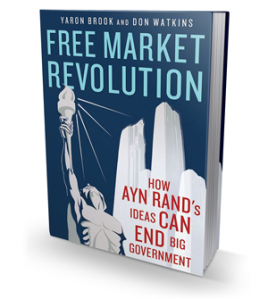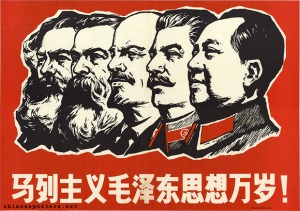
A work discussing Ayn Rand’s morality in relation to the fight for freedom. This book is not the source of this essay.
Many people who consider themselves libertarians also consider themselves “anarcho-capitalists.” (AnCaps) They don’t believe there should be a government with a monopoly over the use of retaliatory force in a given geographic area. Yet Ayn Rand’s philosophy of Objectivism advocates for such a monopoly government. AnCaps believe that Objectivism is misguided, because they hold there is a contradiction between advocating for the Non-Aggression Principle (NAP) and advocating for a governmental monopoly that is prepared to use force to exclude competitors.
This essay will show how Objectivism is right, and there is no contradiction between upholding the Non-Initiation of Force Principle (NIFP) and advocating for a monopoly government. It will show that a certain kind of governmental monopoly is necessary for the protection of people’s individual rights; that is, the protection of people from initiatory and unjust coercion. I think you’ll find that an Objectivist critique of anarcho-capitalism is rather different from other criticisms of anarcho-capitalism and anarchism.
[Note: A summary of this essay appears at the end. But please read the whole essay before criticizing.]
We Currently Live Under Market Anarchy and the “Market in Force” Has Failed: Now What? [Permalink]
So what is “market anarchy?” At the most basic level, what market anarchists think they are advocating for is to “let the market decide” what sorts of measures are taken for the retaliatory use of force against aggressors. In other words, they think they are advocating for unrestrained individual choice in the use of force. They think that, if only individual choice were “freed from a state,” the result would be smaller, Private Defense Agencies (PDAs) and/or private Dispute Resolution Organizations (DROs).
But if “market anarchy” means “unrestrained individual choice in the use of force,” then there is literally nothing that any individual–or any private defense agency–could do that would stop a condition of market anarchy from prevailing. The unlimited discretion in the use of force that AnCaps assign to each individual client of a defense agency, also applies to the individuals that compose the defense agency. So people can choose to have a defense agency that permits the mutilation of babies’ genitals, the killing of children for “dishonoring” their families, that punishes theft by dismemberment or death, that preemptively kills suspicious neighbors, and this is all covered under the label “market anarchy.” Similarly, any defense agency can collect taxes, coercively regulate business, arbitrarily abduct its clients to walled compounds, restrict sales of guns, conduct wars of aggression and crush other defense agencies, all under the label of “market anarchy.”
So, actually, the entire world is in a state of market anarchy, by the above definition. Those AnCaps in the territory of the USA are entirely free to form their own defense agencies and compete for clients with the giant, bloated defense agency that is the US Federal Government. The “market in force,” which is “unrestrained individual choice in the use of force,” has produced this behemoth. Defined this way, the AnCap “free market” has chosen a coercive state as its defense agency. And it should be plainly obvious to any reasonable AnCap that, in this current market, start-up defense agencies cannot hope to compete with the US Government. Humans started stateless, then got into tribal wars with each other, and later formed states as their DROs that startups can’t possibly compete with. Where were the anarchic “market forces” that were supposed to prevent this from happening the first time? This is a “market failure” at its most spectacular.
Continue reading →
 Here’s a list of possible ways I’ve thought of or heard to fund government, without the government initiating force to collect taxes:
Here’s a list of possible ways I’ve thought of or heard to fund government, without the government initiating force to collect taxes:

 There’s a little school in California’s Orange County that not too many people know about. But this school should be the talk of the education world, because it’s an amazingly good school. This is VanDamme Academy, a small K-8 school in Aliso Viejo, California.
There’s a little school in California’s Orange County that not too many people know about. But this school should be the talk of the education world, because it’s an amazingly good school. This is VanDamme Academy, a small K-8 school in Aliso Viejo, California.

 Socialism has become more popular in the US recently, at least as a term people use for their political beliefs. Bernie Sanders and many of his young followers claim to be socialists. But what is socialism, really, and is it a moral system or an immoral one? Is it practical or impractical?
Socialism has become more popular in the US recently, at least as a term people use for their political beliefs. Bernie Sanders and many of his young followers claim to be socialists. But what is socialism, really, and is it a moral system or an immoral one? Is it practical or impractical?

